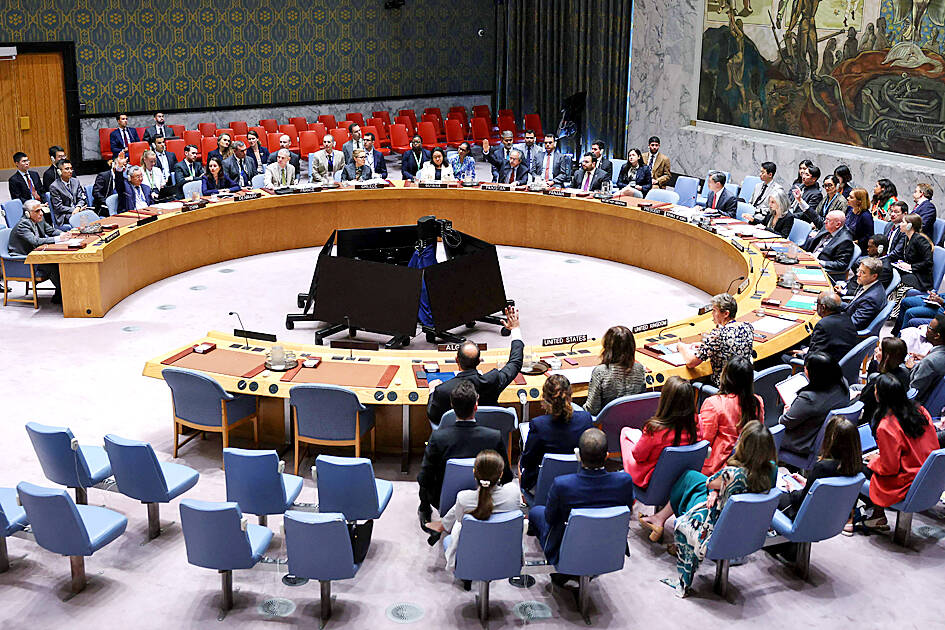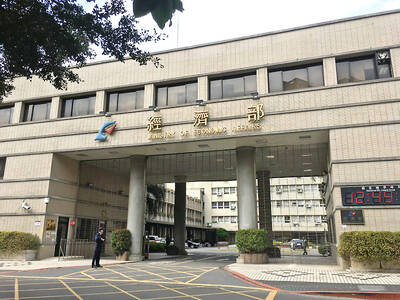Estonia said on Sunday that the UN Security Council would hold an emergency meeting on the violation of the country’s airspace by Russian fighter jets, an incursion condemned by US President Donald Trump.
NATO forces intercepted three Russian MiG-31 fighters on Friday after they entered Estonian airspace over the Gulf of Finland, triggering complaints of a dangerous new provocation from the transatlantic alliance and the EU.
The Security Council was to convene an emergency session yesterday “in response to Russia’s brazen violation of Estonian airspace,” the Estonian Ministry of Foreign Affairs said.

Photo: AFP
The incursion came after fellow NATO member Poland said earlier this month Russian drones had repeatedly violated its airspace, in what Warsaw condemned as an “act of aggression.”
Trump on Sunday joined the condemnation of the latest airspace violation, vowing to defend Poland and the Baltic states in case of escalation from Russia.
Asked whether he would help defend the EU members if Russia intensifies hostilities, Trump told reporters: “Yeah, I would. I would.”
Trump’s at times friendly relations with Russian President Vladimir Putin have appeared to fray as the latter continues to press his invasion of Ukraine despite the US leader’s push for peace.
Trump on Thursday said at the close of a state visit to the UK that Putin had “really let me down” by continuing the war, now in its fourth year.
Western powers have said that Russia was playing with fire with its repeated ventures into NATO airspace, whose members have a mutual defencs assistance pact.
In the incident in Estonian airspace, Italian F-35 jets attached to NATO’s air defense support mission in the Baltic states, along with Swedish and Finnish aircraft, were scrambled to intercept the Russian jets and warn them off.
Asked whether he had been briefed on the situation in Estonia, Trump answered in the affirmative and added: “We don’t like it.”
That was a change in tone from his reaction to the Polish airspace incursion earlier in the month, which he said “could have been a mistake.”

LIMITS: While China increases military pressure on Taiwan and expands its use of cognitive warfare, it is unwilling to target tech supply chains, the report said US and Taiwan military officials have warned that the Chinese People’s Liberation Army (PLA) could implement a blockade within “a matter of hours” and need only “minimal conversion time” prior to an attack on Taiwan, a report released on Tuesday by the US Senate’s China Economic and Security Review Commission said. “While there is no indication that China is planning an imminent attack, the United States and its allies and partners can no longer assume that a Taiwan contingency is a distant possibility for which they would have ample time to prepare,” it said. The commission made the comments in its annual

DETERMINATION: Beijing’s actions toward Tokyo have drawn international attention, but would likely bolster regional coordination and defense networks, the report said Japanese Prime Minister Sanae Takaichi’s administration is likely to prioritize security reforms and deterrence in the face of recent “hybrid” threats from China, the National Security Bureau (NSB) said. The bureau made the assessment in a written report to the Legislative Yuan ahead of an oral report and questions-and-answers session at the legislature’s Foreign Affairs and National Defense Committee tomorrow. The key points of Japan’s security reforms would be to reinforce security cooperation with the US, including enhancing defense deployment in the first island chain, pushing forward the integrated command and operations of the Japan Self-Defense Forces and US Forces Japan, as

‘TROUBLEMAKER’: Most countries believe that it is China — rather than Taiwan — that is undermining regional peace and stability with its coercive tactics, the president said China should restrain itself and refrain from being a troublemaker that sabotages peace and stability in the Indo-Pacific region, President William Lai (賴清德) said yesterday. Lai made the remarks after China Coast Guard vessels sailed into disputed waters off the Senkaku Islands — known as the Diaoyutai Islands (釣魚台) in Taiwan — following a remark Japanese Prime Minister Sanae Takaichi made regarding Taiwan. Takaichi during a parliamentary session on Nov. 7 said that a “Taiwan contingency” involving a Chinese naval blockade could qualify as a “survival-threatening situation” for Japan, and trigger Tokyo’s deployment of its military for defense. Asked about the escalating tensions

The Ministry of Economic Affairs said it plans to revise the export control list for strategic high-tech products by adding 18 items under three categories — advanced 3D printing equipment, advanced semiconductor equipment and quantum computers — which would require local manufacturers to obtain licenses for their export. The ministry’s announcement yesterday came as the International Trade Administration issued a 60-day preview period for planned revisions to the Export Control List for Dual Use Items and Technology (軍商兩用貨品及技術出口管制清單) and the Common Military List (一般軍用貨品清單), which fall under regulations governing export destinations for strategic high-tech commodities and specific strategic high-tech commodities. The